This article was co-authored by wikiHow staff writer, Dev Murphy. Our trained team of editors and researchers validate articles for accuracy and comprehensiveness.
wikiHow’s Content Management Team carefully monitors the work from our editorial staff to ensure that each article meets our high quality standards.
This article has been viewed 26,498 times.
Learn more...
To stack or not to stack? It’s a hotly debated topic when it comes to the classic card game Uno: when presented with a Draw card, can you stack another Draw card if you have one, passing the burden to draw onto the next player? Or must you simply draw the assigned number of cards and miss your turn? Keep reading to learn the ins and outs of Uno, including the official stacking rules—and the not-so-official ones.
Things You Should Know
- Don’t stack your cards if you want to follow the official Uno rules. Uno has stated that stacking is not a legitimate move.
- If you want to play a variation on the official Uno rules, stack those Draw cards—just make sure all players are in agreement about stacking rules prior to gameplay.
- Choose to only stack Draw 2 cards or stack Draw 2 and Wild Draw 4 cards. The player at the end of the stack may have to draw upwards of 12 cards!
Steps
How to Bend the Rules and Stack Cards
-
1For the tamest stacking game, only stack Draw 2 cards. To follow the most common stacking rules, only stack Draw 2 cards. Not stacking any cards at all keeps the game relatively tame, but stacking Draw 2 cards allows you to kick up the intensity a bit. In this variation, if a player lays down a Draw 2 card, the next player may draw 2 cards or may counter the initial draw card with their own Draw 2 card, forcing the next player to draw 4 cards. You cannot stack Wild Draw 4 cards.[2]
- If that player has a draw card, the next player will draw 6 cards.
-
2To add some heat, stack Draw 2s on Draw 2s and Draw 4s on Draw 4s. In this variation, players may stack Draw 2 cards onto Draw 2 cards and Wild Draw 4 cards onto Wild Draw 4 cards. However, you cannot stack Draw 2 cards onto Wild Draw 4 cards and vice versa.[3]
- This variation offers the opportunity for a bit more excitement, as the player at the end of the stack may end up having to draw even more cards.
-
3For the most intense game, stack any Draw card. In this variation, if a player lays down a Draw 2 card, the following player may stack either a Draw 2 card or a Wild Draw 4 card. If a Wild Draw 4 is laid down, the next player may lay a Wild Draw 4 card or a Draw 2 card.[4]
- This variation allows for the possibility that the player who eventually draws will be forced to draw a lot of cards—even 12 or more! Play this variation if you’re feeling particularly vindictive.
Official Uno Rules
-
1Make sure all players understand how to play the game. The objective of Uno is to score 500 points. The first player to run out of cards in each round scores points by combining the cards their opponents are left holding. Whoever earns 500 points first wins the game.[5]
- Each card is worth a different number of points. All number cards are worth their face value; Draw 2, Reverse, and Skip cards are each worth 20 points; and Wild and Wild Draw 4 cards are each worth 50 points.
- To avoid players getting upset mid-game when they realize stacking either is or is not allowed, establish ground rules before beginning the game!
-
2Shuffle the deck, then draw cards to determine the dealer. Have each player draw one card from the deck. The player who draws the highest point value is the dealer. Return all cards to the deck after identifying the dealer.[6]
- There are 112 cards in an Uno deck: 19 blue cards, 19 red, 19 yellow, and 19 green; 8 Skip cards (2 of each color); 8 Reverse cards (again, 2 per color); 8 Draw +2 cards (2 of each color); 4 Wild cards; 4 Wild Draw +4 cards; and 4 blank cards.
-
3Instruct the dealer to deal every player 7 cards and form a draw pile. Tell players to conceal their cards. The remaining cards become the draw pile, which every player will draw cards from on their turn, if they are required to draw a card.[7]
-
4Form a discard pile to begin the game. The dealer must draw the top card from the deck, flip it, and lay it beside the deck to form the discard pile. Every subsequent card that is played will be laid on the discard pile.[8]
- If the top card is a Wild card or a Wild Draw +4 card, return it to the deck and pick another card. Insert the Wild or Wild Draw +4 card into the middle of the deck or underneath the deck.
-
5Take turns playing cards that match the top card on the discard pile. The card played must match the color, symbol, or number of the card in the discard pile. The player to the left of the dealer must play the first card, and then play continues clockwise.[9]
- For instance, if the top card is a blue 4, the player can lay down another blue card, or a different-colored 4 card.
- If a player cannot play any cards, they must play a Wild card or draw until they can play a card. They could draw a playable card immediately—or they may draw 5 or 10 cards they cannot lay down!
-
6Play Wild cards to choose a new color. Each deck contains both Wild cards and Wild Draw 4 cards, both of which have the power to override the current color. Note, however, that Wild cards and Wild Draw 4 cards are different. Wild cards may be played at any time, and the player who lays a Wild card may change the current color in play to any color.
- Wild Draw 4 cards may only be played when the player has no other appropriate cards to lay down. The player who lays this card down may choose a new color—and the player that follows them must draw 4 cards (or stack another draw card, if acceptable).
-
7Play an Action card to disrupt gameplay for your opponents. In addition to Draw 2, Wild Draw 4, and Wild cards, there are Reverse cards and Skip cards. Reverse cards reverse the direction of game play, and Skip cards skip the next player’s turn.[10]
- Prevent the next player from playing their final card by skipping their turn or reversing the direction of the game, or put the person after them on the spot by skipping directly to them!
- Blank cards are also included in the deck. If you lose any standard cards, you may replace it with a Blank card. For instance, if you lose a blue 7, you would take a blue Blank card and draw a 7 on it.
-
8Say “Uno” when you play your second-to-last card, or else draw 4. If you do not say “Uno” before your card touches the discard pile and another player catches you with only one card before the next player takes their turn, you must draw 4 cards from the deck.[11]
- If you play your second-to-last card and do not say “Uno” and nobody notices before the next player takes their turn, you are in the clear and don’t have to draw 4 cards. Yippee!
-
9Discard all of your cards to end a round and win points. Every time a player runs out of cards, a round ends. Tally the points earned from each of the other players' remaining cards. Shuffle the deck and deal new hands to begin another round. Play until one player has earned 500 points.[12]
References
- ↑ https://twitter.com/realUNOgame/status/1183792094374182914
- ↑ https://www.thegamer.com/uno-stacking-rule-wrong-internet/
- ↑ https://www.thegamer.com/uno-stacking-rule-wrong-internet/
- ↑ https://www.thegamer.com/uno-stacking-rule-wrong-internet/
- ↑ https://service.mattel.com/instruction_sheets/42001pr.pdf
- ↑ https://service.mattel.com/instruction_sheets/42001pr.pdf
- ↑ https://service.mattel.com/instruction_sheets/42001pr.pdf
- ↑ https://service.mattel.com/instruction_sheets/42001pr.pdf
- ↑ https://service.mattel.com/instruction_sheets/42001pr.pdf
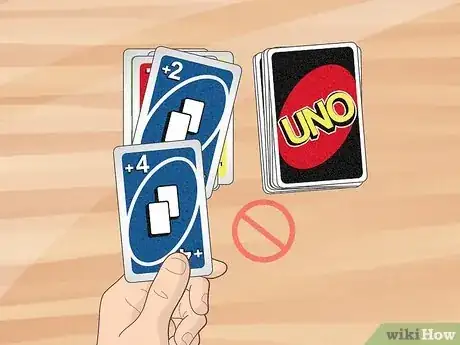
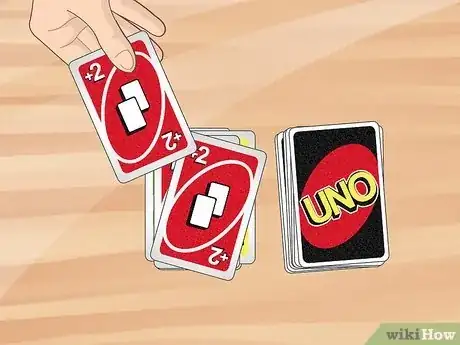
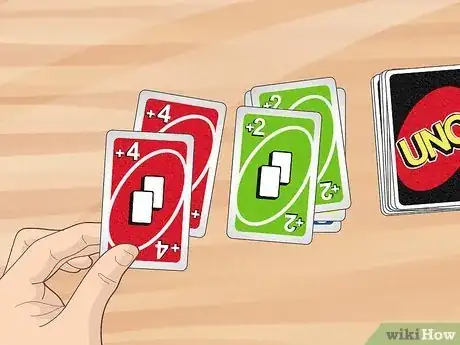
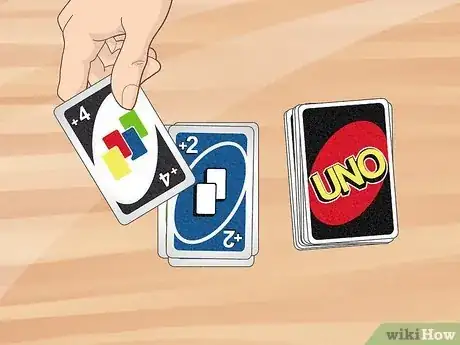

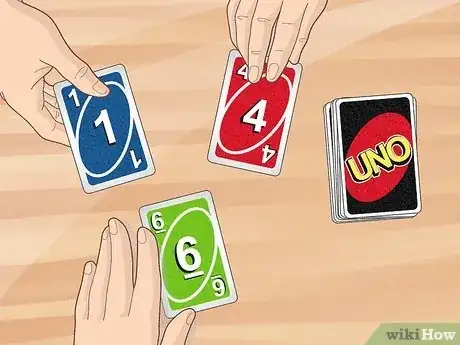
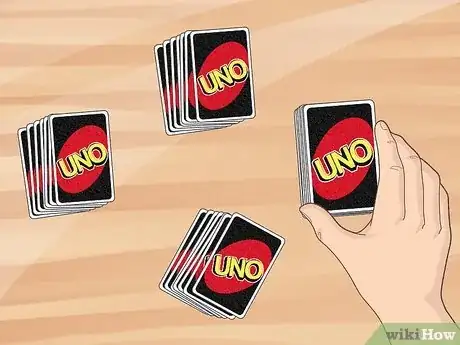
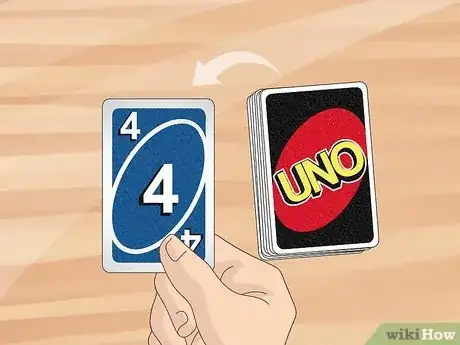
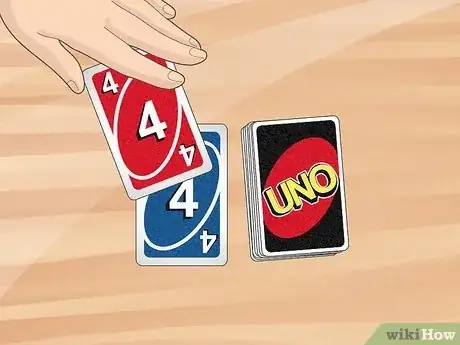
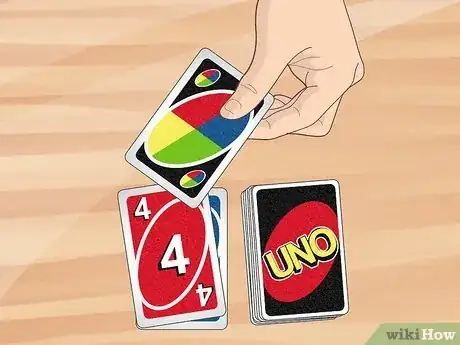
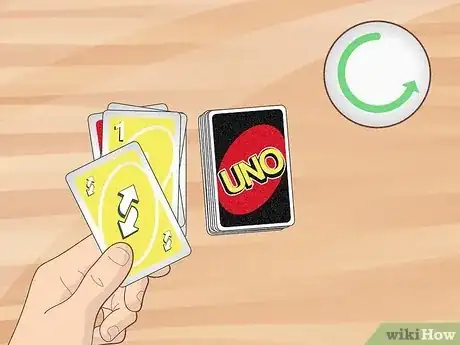
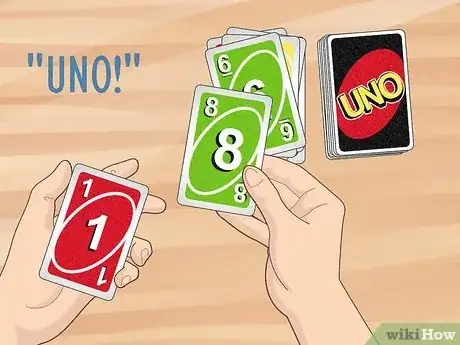
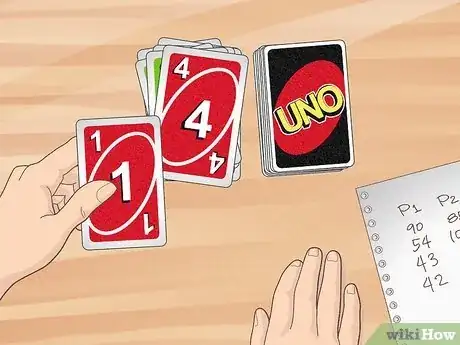
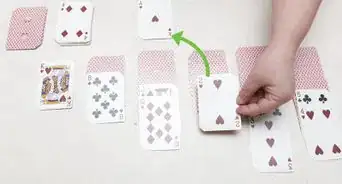
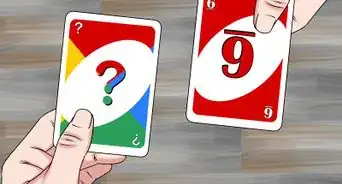
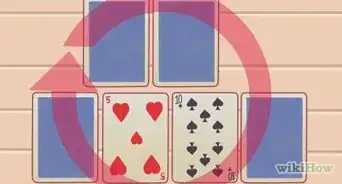
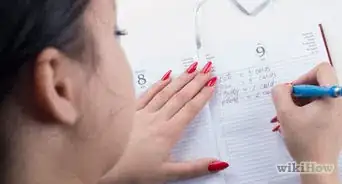
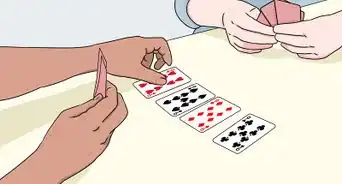
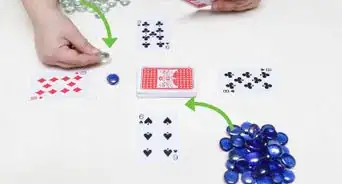
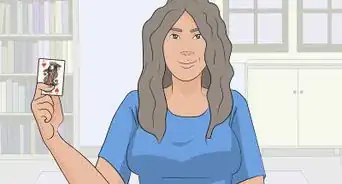
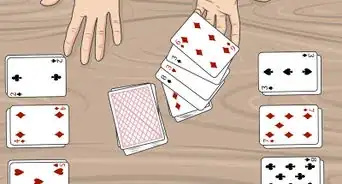
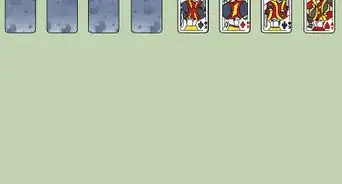
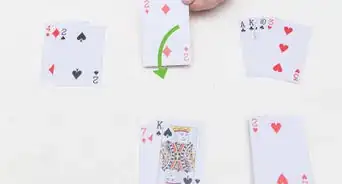
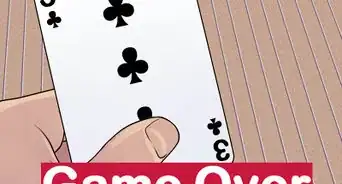







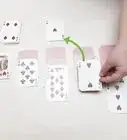
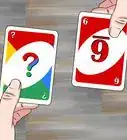
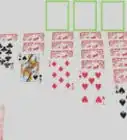
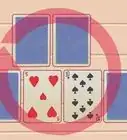

































wikiHow’s Content Management Team carefully monitors the work from our editorial staff to ensure that each article meets our high quality standards. This article has been viewed 26,498 times.